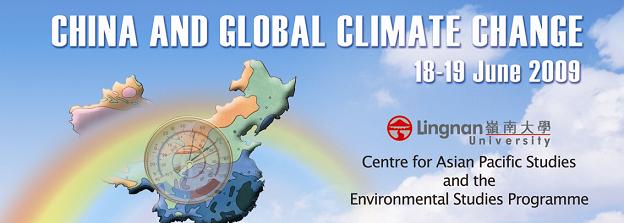
Event Title
Conference on China and Global Climate Change : Reconciling International Fairness and Protection of the Atmospheric Commons Digital Commons
Location
AM308, Lingnan University
Start Date
18-6-2009 11:00 AM
End Date
18-6-2009 12:30 PM
Language
English
Description
Assuming that all nations have the ethical obligation to reduce emissions to their global fair share, this paper investigates how distributive and procedural justice obligations, under the broader rubric of Ethical Dimensions of Climate Change program, play out across various political and ecological scales in China. As China is such a large and necessary player in any global strategies for addressing climate change, it is imperative that the nation receive closer ethical investigation across scales and sectors, and that other nations and multi-national corporations do their fair share in helping China's various regions and sectors reach its obligations in a post-Kyoto regime. To address the challenges to distributive and procedural justice that emerge at global, regional, national, intra-regional, provincial, urban, and small town & village levels, this paper proposes a multi-scalar ethical framework for evaluating China's climate strategies as the nation formalizes its obligations to the principle of "Common but Differentiated Responsibility," (CDR) and to a framework of Contraction and Convergence (C&C). Part of the difficulty in addressing China's mitigation obligations is in the ongoing articulation of the problem as primarily an obligation of national level governance, a structural result of UNFCCC requirements. However, due to China's complexity in both size and population, both CDR and C&C require a more nuanced and complex articulation of ethical and practical problems across political and ecological scales. As such, implementing China's National Climate Change Programme (CNCCP) will require mitigation management targeting not just political, but ecosystem scales as well. In addition, the Central Government will need to allow or provide for a "lateral" political agency for ecosystem management efforts, so that institutions at similar scales can plan and co-ordinate more readily.
Document Type
Presentation
Recommended Citation
Schienke, E. W. (2009). The Chinese [climate] box: A scalar approach to evaluating ethical obligations in climate strategies for China. In China and global climate change: Proceedings of the conference held at Lingnan University, Hong Kong, 18-19 June 2009 (pp. 100-113). Centre for Asian Pacific Studies and the Environmental Studies Programme, Lingnan University, Hong Kong.
Included in
The Chinese [climate] box : a scalar approach to evaluating ethical obligations in climate strategies for China
AM308, Lingnan University
Assuming that all nations have the ethical obligation to reduce emissions to their global fair share, this paper investigates how distributive and procedural justice obligations, under the broader rubric of Ethical Dimensions of Climate Change program, play out across various political and ecological scales in China. As China is such a large and necessary player in any global strategies for addressing climate change, it is imperative that the nation receive closer ethical investigation across scales and sectors, and that other nations and multi-national corporations do their fair share in helping China's various regions and sectors reach its obligations in a post-Kyoto regime. To address the challenges to distributive and procedural justice that emerge at global, regional, national, intra-regional, provincial, urban, and small town & village levels, this paper proposes a multi-scalar ethical framework for evaluating China's climate strategies as the nation formalizes its obligations to the principle of "Common but Differentiated Responsibility," (CDR) and to a framework of Contraction and Convergence (C&C). Part of the difficulty in addressing China's mitigation obligations is in the ongoing articulation of the problem as primarily an obligation of national level governance, a structural result of UNFCCC requirements. However, due to China's complexity in both size and population, both CDR and C&C require a more nuanced and complex articulation of ethical and practical problems across political and ecological scales. As such, implementing China's National Climate Change Programme (CNCCP) will require mitigation management targeting not just political, but ecosystem scales as well. In addition, the Central Government will need to allow or provide for a "lateral" political agency for ecosystem management efforts, so that institutions at similar scales can plan and co-ordinate more readily.

